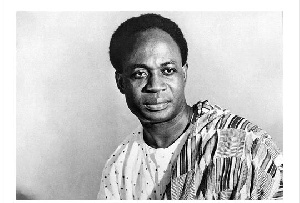Yesterday (21st September) is Kwame Nkrumah Memorial Day, a day set aside to remember and honor Ghana’s first President.
In the past the celebration of the day had been marked with some controversy in the past, and today’s celebration is no different.
While many are of the view that Dr Nkrumah is the sole founder of the nation, others think there were many people who contributed to the founding of the modern state of Ghana, notably the other members of Big Six.
Role of the Big Six
They argue that the other five members of the Big Six; William Ofori Atta, Ako Adjei, J.B Danquah, Edward Akufo-Addo and Obetsebi Lamptey, also played pivotal roles in the independence struggle and ought to be celebrated alongside the first President.
According to the pro Danquah faction, Dr Nkrumah was invited to serve as the General Secretary to the United Gold Coast Convention (UGCC) under Dr J. B. Danquah.
He returned to Ghana in 1947 to take up the position but split from the UGCC in 1949 to form the Convention People’s Party (CPP).
In February 1948, the police opened fire on ex-servicemen protesting the rising cost of living, spurring riots in Accra, Kumasi and elsewhere.
The colonial government suspected the UGCC was behind the protests and arrested Dr Nkrumah and other party leaders.
Realising their error, the British soon released the leaders. After his imprisonment by the colonial government, Dr Nkrumah emerged as the leader of the youth movement in 1948.
After his release, Dr Nkrumah went round the country proclaiming that the Gold Coast needed “self-government now”, while Dr Danquah was for independence in the foreseeable future.
Background
Meanwhile, President Nana Addo Dankwa Akufo-Addo has proposed a legislation to Parliament to designate August 4 as Founders Day to celebrate the Big Six, while 21st September will be known as Kwame Nkrumah Memorial Day, both of which will be observed as public holidays.
A statement from the Presidency and signed by the Director of Communications at the Presidency, Mr Eugene Arhin, last Sunday said, “The President has to this end issued an Executive Instrument to commemorate this year’s celebration of Kwame Nkrumah Memorial Day as a public holiday.”
Activities
As part of activities to celebrate Dr Nkrumah, the youth wing of the CPP is organising a youth dialogue in Accra, while the party itself is holding a press conference at the party headquarters to eulogise the former President. The NDC is also organising a solidarity march to commemorate the day.
Profile of Kwame Nkrumah
Former President John Evans Atta Mills’ government initiated a legislation in Parliament to declare today, September 21, a holiday in memory of Dr Nkrumah.
Osagyefo Dr Kwame Nkrumah, Ghana’s first President, was born on September 21, 1909 at Nkroful in the Western Region.
He attended Achimota School and also trained as a teacher. He went to the United States in 1935 for advanced studies, receiving a B.A. from Lincoln University in 1939.
He also received an STB (Bachelor of Sacred Theology) in 1942, a Master of Science in Education from the University of Pennsylvania in 1942 and a Master of Arts in Philosophy the following year.
Elected
While lecturing in Political Science at Lincoln, Dr Nkrumah was elected President of the African Students Organisation of America and Canada.
He continued his schooling in England, where he helped to organise the Fifth Pan-African Congress in 1945.
He then founded the West African National Secretariat to work for the decolonisation of Africa. Nkrumah also served as Vice-President of the West African Students’ Union (WASU).
During his lifetime, Nkrumah was awarded honorary doctorates by Lincoln University, Moscow State University, Cairo University, Jagielloniaan University in Krakow, Poland and Humboldt University in former East Germany.
Formation of the CPP
On June 12, 1949, Dr Nkrumah led the formation of the CPP at Arena in Accra before a crowd of some 60,000.
He was made Chairman, with Komla Agbeli Gbedemah as Vice Chairman and Kojo Botsio as Secretary. Other members of the Central Committee included N.A. Welbeck, Kwesi Plange, Krobo Edusei, Dzenkle Dzewu and Ashie Nikoi.
Dr Nkrumah declared “positive action” on January 8, 1950 in front of a large CPP crowd at a public meeting in Accra. He travelled to Sekondi, Cape Coast and Takoradi to repeat it.
The colonial government declared a state of emergency which took effect from January 12, 1950 and prohibited the holding of processions, imposed curfews and disconnected public services in certain areas.
Three years imprisonment
Dr Nkrumah was arrested on January 21, 1950, tried for inciting an illegal strike and sedition for an article in the Cape Coast Daily Mail and sentenced to three years imprisonment.
Mr Gbedemah kept the party running and was in constant touch with Dr Nkrumah who was held at the James Fort Prison from where messages were smuggled out on toilet paper to the party headquarters.
Stunning victory
While in prison, Dr Nkrumah led the CPP to achieve a stunning victory in the February 1951 election.
He was freed to form a government, and he led the colony to independence in 1957.
A firm believer in African liberation, Nkrumah pursued a radical pan-African policy, playing a key role in the formation of the Organisation of African Unity in 1963.
At home, he led a massive socio-economic development that saw the springing up of infrastructure across the country.
As time passed, he was accused of being a dictator and also of forming a one-party state in 1964, with himself as President for life, as well as actively promoting a cult of his own personality.
Overthrown by the military in 1966 with the help of Western backing, he spent his last years in exile, dying in Bucharest, Romania, on April 27, 1972. His legacy and dream of a “United States of Africa” still remains a goal among many.
General News of Friday, 22 September 2017
Source: theled.com.gh

















